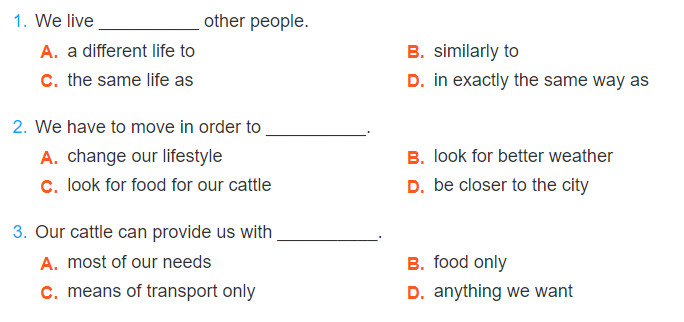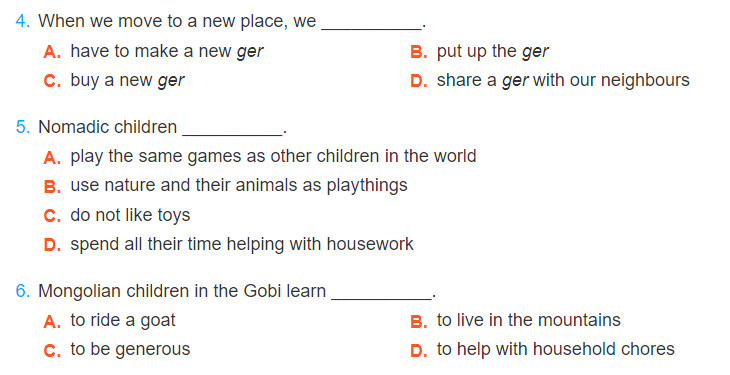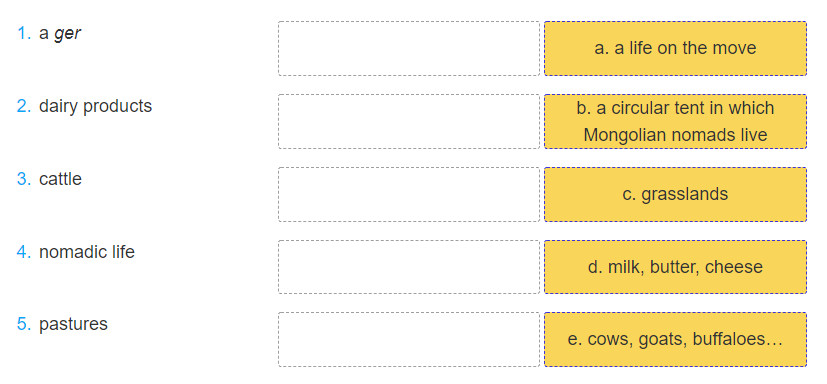1 what do you think ?
Which change in the listening do you see as positives ? Which do you see as negative ? Support your opinion with a reason . Write it out ( page 23)
2 read the passage again and choose the best answer A,B,C,D

 4 Matching
4 Matching

Hãy nhập câu hỏi của bạn vào đây, nếu là tài khoản VIP, bạn sẽ được ưu tiên trả lời.

It’s good for the villagers to have TVs. They can now have more fun and .earn more about different people and different places.

Tham khảo:
1. It's cheap. You have to actively try to spend more than $20 on a meal, even a good one. A movie still costs single digits. No one has a clue or cares what brand of clothing you're wearing, let alone whether your shoes, purse or belt are this year's season or last. And did I mention housing? You can live in a real house with multiple bedrooms, multiple bathrooms and a garage. Maybe even a pool. And you can own it for under $200,000. Yup, you read that right. I didn't leave off any zeros.
2. There's space – for you, for your dog, for your kids, between you and your annoying neighbors. An ad on the NY subway sums up: "Raising a baby in an NYC apartment is like growing an oak tree in a thimble." In the city, you live on top of each other. Your kids and your dog barely know what grass is. In the country, you have something called a yard. You run around, kick a football and chase fireflies. You go sledding and build snowmen on fresh snow that hasn't been trodden by hundreds of others. You can actually identify constellations because you see lots of them each night. You are fascinated by a lot more interesting animals than squirrels, and your dog acts like a dog, you don't have to carry around bags for its poop.
Advertisement 3. There are no billionaires. And frankly, few millionaires. To put it another way, there's a lot less income inequality. Since the cost of living is much lower, even those on the median family income (about $50,000 in the US) can have a decent life. You don't feel poor as you do in big cities where even those earning six-figures still believe they're "just getting by". In the country, you aren't constantly aware of your socioeconomic status. You worry a lot more about the weather.
4. You aren't reliant on public transit. You don't have to push your way onto an overcrowded subway car only to find yourself squashed next to someone who smells or elbows you. You aren't late because there's been a delay and some robot-like voice has to tell you about it over and over on the speaker. You can drive yourself where you want, when you want. Even if there's traffic (and there isn't much outside of cities), you can usually find another way to go. You are in control, and there's plenty of (free) parking.
5. You don't get suspicious when people are nice to you. People say hello and "how are you" and generally mean it. You go to the grocery store and have a decent chance of seeing at least someone you know. Your doctor actually calls you back the same day you call with a concern. People don't size you up constantly based upon your job, social status or income. Volunteer work isn't something you do for your resume. You feel a part of a genuine community, not just one peon out of millions.
Chúc bạn học tốt!

my name is Chi
i live in Bac Giang
i'm in class 5a
ko có câu tl
my favourite subject is math
ko có câu tl
yes, i do
my hobby is listening to music
my best friend name is Nguyen
no, i don't
no, i don't
no, i don't
k mk nhé
My name is Hieu.
I live in Can Tho city.
I'm in class 7p2.
a intelligent boy.
Math, English, Physics,....
Sorry, I don't hate anything, I'm just scared.
Yes, I read a book about 3 hours / day.
I love read a book, tidy room, make breakfast for my family, ....
My best friend name is Bao, Pham Quoc Bao.
Yes, but not much.
No, I'm just scared.
Yes of cause, what is your name ?
BYE

Đáp án C
Theo đoạn văn, câu nào sau đây là không đúng?
A. Khả năng đàm phán hiệu quả cũng quan trọng như các kĩ năng thực hành.
B. Người xin việc cần phải nghiên cứu công việc họ đang nộp đơn xin một cách kĩ càng trước khi viết bản sơ yếu lí lịch.
C. Người xin việc không nên nộp đơn xin một công việc khác với công việc mà họ đang làm.
D. Những thông tin mà người đi phỏng vấn trình bày nên có liên quan đến công việc mà họ đang xin.
Từ khóa: not true
Căn cứ vào các thông tin trong đoạn văn:
“However, your ability to negotiate effectively, for example, can be just as important as your technical skills.” (Tuy nhiên, khả năng đàm phán hiệu quả của bạn cũng quan trọng như các kĩ năng thực hành.)
“All information you give should be relevant, so carefully consider the job for which you are applying. If you are applying for a job that is somewhat different than your current job, it is up to you to draw a connection for the resume reviewer, so that they will understand how your skills will fit in
their organization.” (Tất cả các thông tin bạn cung cấp nên có mối liên quan với nhau, vì vậy hãy nghiên cứu công việc bạn định xin một cách kĩ càng. Nếu bạn đang xin một công việc, về mặt nào đó, khác với công việc hiện tại của bạn, bạn nên tạo sự liên kết giữa 2 công việc để người đọc bản sơ yếu lý lịch hiểu được các kĩ năng của bạn phù hợp với tổ chức của họ).

Đáp án C
Theo đoạn văn, thông tin nào những người xin việc nên bao hàm trong bản sơ yếu lí lịch của họ?
A. các kĩ năng cụ thể cho các công việc trước đây
B. các thành tựu đạt được trong quá khứ
C. các chức vụ, vị trí công việc trước đây
D. mục tiêu trong tương lai
Từ khóa: information/ include in their resume
Căn cứ các thông tin trong đoạn văn:
“The biggest problem is perhaps listing the duties for which you were responsible in a past position: all this tells your potential employers is what you were supposed to do. They do not necessarily know the specific skills you used in executing them, nor do they know what results you achieved - both of which are essential” (Vấn đề lớn nhất có lẽ là liệt kê các công việc mà bạn đã làm trong chức vụ trước đây: tất cả những điều này nói cho nhà tuyển dụng tiềm năng của bạn biết những gì bạn có thể làm được. Họ không cần thiết phải biết những kĩ năng cụ thể bạn đã sử dụng để thực hiện các nhiệm vụ đó, họ cũng không cần biết kết quả bạn đã đạt được là gì – cả hai thứ đó đều rất quan trọng).
“Writing what you are trying to achieve in life - your objective - is a waste of space.” (Viết về những điều bạn đang cố gắng đạt được trong cuộc sống - mục tiêu của bạn - là một sự lãng phí giấy).

Đáp án B
Chủ đề CHOOSING A CAREER
Đoạn văn chủ yếu thảo luận về chủ đề gì?
A. Cách viết bản sơ yếu lý lịch để xin việc.
B. Những lỗi mọi người thường gặp phải khi nộp đơn xin việc.
C. Cách thông thường để tạo ấn tượng tốt trong một cuộc phỏng vấn xin việc.
D. Những kĩ năng cần thiết để xin việc.
Căn cứ vào thông tin đoạn 1:
“There are many mistakes that people make when writing their resume (CV) or completing a job application. Here are some of the most common and most serious."
(Có nhiều lỗi mà mọi người thường gặp khi viết bản sơ yếu lí lịch hay hoàn thành hồ sơ xin việc. Dưới đây là một vài lỗi thường gặp và nghiêm trọng nhất.)
đăng kí cho Nguyễn Nhật Đăng tv